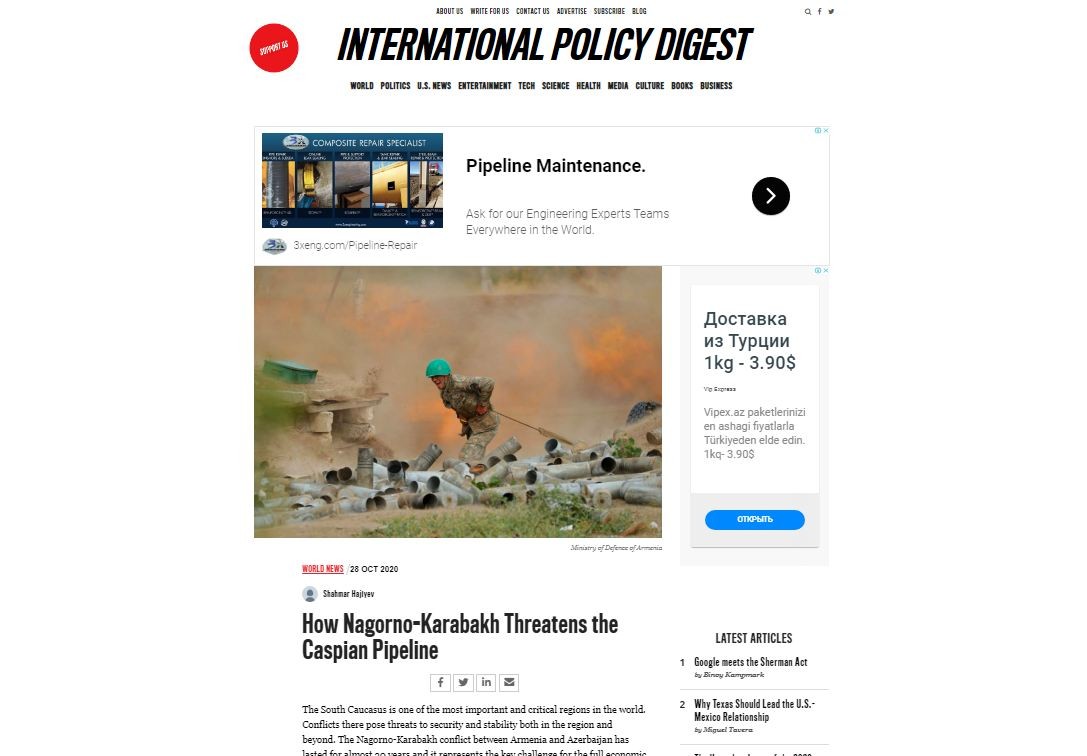The South Caucasus is one of the most important and critical regions in the world. Conflicts there pose threats to security and stability both in the region and beyond. The Nagorno-Karabakh conflict between Armenia and Azerbaijan has lasted for almost 30 years and it represents the key challenge for the full economic integration of the region.
The recent tensions between Armenia and Azerbaijan became even worse when Armenian Prime Minister Nikol Pashinyan called into question the “Madrid Principles,” upsetting the delicate balance by publicly raising doubts about the current framework of negotiations.
On July 12, 2020, even before the current hostilities, Armenia attacked Azerbaijan’s Tovuz region, on the Armenian-Azerbaijani border far from Nagorno-Karabakh. Artillery fire caused the death of several civilians and high-ranking military officials. The Tovuz attack threatened important energy and infrastructure projects such as the Baku-Tbilisi-Ceyhan (BTC) and Baku–Supsa oil pipelines, the Southern Gas Corridor (SGC), and the Baku-Tbilisi-Kars railroad.
In early October, Armenian missile batteries had attacked Ganja, Azerbaijan’s second-largest city, and the principal one lying in the “Ganja Gap,” through which Caspian oil and gas resources pass on their way to international energy markets. Spectacularly, the head of the local Armenian administration in Nagorno-Karabakh, Arayik Harutyunyan, publicly acknowledged that he had personally ordered attacks on military facilities in the city, although the rocket bombardment fell nowhere near them and instead fell into civilian areas.
Reflecting the opinion of influential Armenian political and military circles, Arman Babajanyan, an Armenian politician, wrote in early October that “Armenian armed forces must continue to target Azerbaijan’s multimillion-dollar Western projects, infrastructure, gas pipelines and oil pipelines in their attacks.” The next attack on critical energy infrastructure occurred on October 6, 2020, in Azerbaijan’s Yevlakh region when a rocket fired from the Armenian side landed within 10 metres of the BTC pipeline.
The BTC oil export pipeline ushered in a new era of economic development. It allowed Azerbaijan to export its oil to global energy markets, relying on Georgia and Turkey. This project has been instrumental in developing and strengthening the so-called East-West corridor for energy, transport, and telecommunications. Azerbaijan’s oil production increased after the BTC pipeline entered into service in June 2006, giving the country new access to international energy markets.
From a geopolitical standpoint, the BTC pipeline was the first project connecting the South Caucasus with Europe, demonstrating also the integration of Azerbaijan and Georgia into Europe. This pipeline contributed to the economic, political, and energy security of all the parties involved.
Many Western companies have huge investments in the region. Armenia’s military activities threaten their energy infrastructure, which are exporting Caspian oil and gas to the global energy markets. Ganja and Yevlakh are close to this strategic energy infrastructure, which connects Azerbaijan energy pipelines to Europe via Georgia and Turkey.
Pipelines are difficult military objectives, however, because they are buried underground and Azerbaijan has advanced air defence systems. However, if Armenia should manage to damage critical infrastructure, then it would not only interrupt the gas and oil supplies to Azerbaijan’s energy partners, affecting their interests as well, but it would also create environmental problems.
It is particularly concerning that these attacks occur just when the first gas from the Caspian Sea region will be supplied to European energy consumers via the Trans-Adriatic Pipeline (TAP). Any reckless actions by the Armenian leadership will directly threaten EU energy security, likely creating even more problems for Armenia itself.
Energy revenues are important for Azerbaijan, but its economy is strong enough to resist such challenges. Azerbaijan is an important net gas producer and exporter, and is seeking to enhance this profile further by deepening its energy relations with Western partners. Many parties are invested in Azerbaijan’s energy sector, and they are not interested in further hostilities in the region.
The South Caucasus Pipeline (SCP), the Trans-Anatolian Natural Gas Pipeline (TANAP), and the TAP are all significant geopolitically. Azerbaijan also has an important role in the Turkish domestic gas market, where its share has gradually increased. In March 2020, this proportion reached 23.45 percent of Turkey’s gas imports. Israeli-Azerbaijani energy cooperation has likewise become very important for Israel’s energy security. Azerbaijan supplies nearly half of Israel’s oil demand via the BTC pipeline.
It follows naturally that Azerbaijan supports regional economic development in the South Caucasus as well as inter-regional projects. It is unfortunate that Armenia has isolated itself from participation in such projects. The Nagorno-Karabakh conflict harms the future development and security of the region. The conflict is a real challenge not only for the security of the South Caucasus but also for the Caspian basin.
Azerbaijan has the economic wherewithal to develop its energy infrastructure and economy. If for any reason there are serious challenges for the national economy as a result of the present situation (or any future one), then the country can access Azerbaijan’s sovereign wealth fund for economic help. Azerbaijan’s sovereign wealth fund also plays important role in the strategic currency reserves of the country.
Notwithstanding the current troubles, Azerbaijan remains capable of pursuing its current energy strategy, including capital investment in energy development. Its geographical position and availability of its own energy resources have enabled it to become an energy and infrastructure hub, exporting Central Asian and Caspian Sea region energy resources to Western energy markets. The country will remain an important and reliable energy player in the Caspian Sea region.
https://intpolicydigest.org/2020/10/28/how-nagorno-karabakh-threatens-the-caspian-pipeline/








